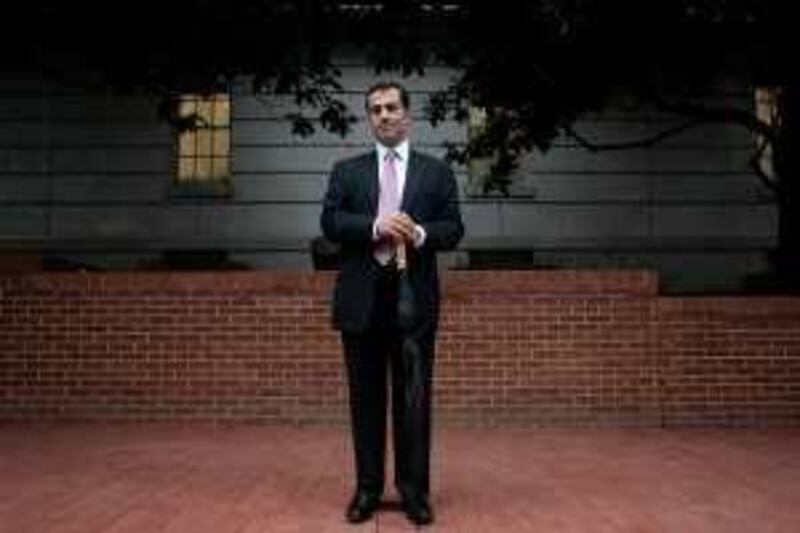NEW YORK // Vali Nasr's view that the West should push for business with the Muslim world rather than an Islamic reformation has significance beyond academia because the Iranian-born professor has the ear of the US administration. Mr Nasr is an adviser to Richard Holbrooke, US special representative to Afghanistan and Pakistan, but his new book presents a strategy for correcting troubled relations with the wider Islamic world beyond the thorny "Af-Pak" region.
Forces of Fortune: The Rise of the New Muslim Middle Class and What it Will Mean for Our World, takes the examples of Dubai and Turkey to explain how building vibrant new economies before instituting political reform can help to combat extremism and transform relations with the West. Although his theory might seem to be self-evident to many Muslims, a US public more used to politicians talking of war rather than business with Islam, seems intrigued.
"I wish you'd told us that 10 years ago," quipped Jon Stewart, a comedian, after Mr Nasr appeared on the Daily Show television programme to promote his book last week. Mr Nasr rejects the "clash of civilisations" theory that posits inevitable conflict between Islam and the West. He says extremism and anti-Americanism took hold in the Muslim world because of the failure of authoritarian governments, supported by the West, to develop a sizeable middle class with a vested interest in openness to trade and global developments.
"After 9/11, there was a fear in the West that any opening to the Muslim world would be a threat. There was also a sense that Muslims would be incapable of reform or supporting democracy or capitalism," said Mr Nasr in a telephone interview from Washington. "Islam as a religion is neither a threat nor as impervious to change as many assume." Mr Nasr argues that it is better to push for economic reform first, then democratisation will follow. Political change is hard to impose and more likely to come when there are authentic demands from a local middle class for the rule of law and an open regulatory framework in which to do business.
"For a while, the West focused on democratisation in the Arab world, not the economy, but it should have been the other way round," Mr Nasr said. "First, there should be economic reform creating a middle class that is integrated into the world economy. Then, down the road, political reform is much easier. "If you look at South Korea, Taiwan or Turkey, political and cultural reforms followed economic reform."
He spoke about the West's "problem of perception" in seeing the Muslim world through a prism that equates the failure of secularism with absolute extremism. To prove the contrary, his book is peppered with anecdotes about conservative Muslims combining their piety with thriving and successful business enterprises. Religion was a private matter for them and did not interfere with the need to create networks and contacts to run their companies.
He dismissed talk of Dubai's demise as overblown, saying debt and real estate troubles only proved its unshakeable connection to the global financial system, much of which remains shaky because of a credit crisis that began in New York. Other Arab emirates or countries might not adopt the Dubai model wholesale, he said, but they are starting to emulate some of its reforms so that, for example, people can get a passport or telecommunications connection in one day.
"Dubai has proven something about the Muslim world. If Muslims are put in a deregulated, open market system with proper laws, they are every bit as capable of acting as rational economic actors as anyone else around the world," he said. "They are just as capitalist as anyone else." He urged the West to reconsider aid policies aimed at either stabilising authoritarian Arab governments or at helping an amorphous poor mass.
Assistance should be better targeted to create a bigger bourgeoisie, such as opening markets and providing trade and technical advice, he said. "Market access to Muslim countries would help them to sell what they produce," he said. "The West needs to see Muslims as anyone else around the world because they represent a 1.2 billion-strong market." Meanwhile, Muslim countries had proved adept at stemming Islamic extremism, particularly after the Iranian revolution, but they needed to move urgently on economic development and reduce state patronage, he said.
Mr Nasr was not able to discuss matters relating to US policy related to Afghanistan and Pakistan, a region under fierce debate as the Obama administration considers a possible increase of troops in the region. But he did say that he was focused on developing a position for the American government to bring more stability to Pakistan, which was left further battered by the global financial crisis. "Muslims are consumers and I mean this in the positive sense that the West should understand they are no different from anyone else," he said.
"They can also be ferocious, capitalist producers and perfectly capable of being part of the global economy." sdevi@thenational.ae





